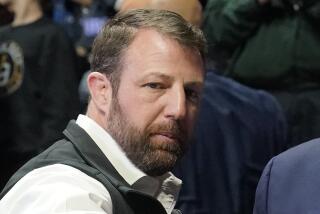McCain Says He Refused Keating Plea for Help : Trial: The Arizona senator testifies that it was his impression that the Lincoln S&L; owner wanted him to negotiate a resolution of his problems.
- Share via
LOS ANGELES — Sen. John McCain, once one of Charles H. Keating Jr.’s good friends, said Friday that he rejected Keating’s request nearly five years ago to act as a negotiator in resolving the long and bitter dispute between thrift regulators and Keating’s Lincoln Savings & Loan.
The Arizona Republican--a former Vietnam POW whom Keating admired but eventually called a wimp--testified in Keating’s criminal securities fraud trial that he told the Phoenix businessman in a heated March, 1987, meeting that it would be improper for a senator to negotiate with regulators.
Though Keating didn’t ask him directly to negotiate a resolution, McCain said that was the impression he got from the meeting. The senator said his refusal to act as a negotiator left Keating “quite angry” and “red in the face.”
“He was very unhappy with me,” the senator said. “I don’t recall his exact words. He got up and left rapidly.”
Still, McCain told a Los Angeles County Superior Court jury, the information available to him on the Irvine thrift at the time “raised serious concerns” about the actions of regulators and indicated that Keating was justified in asking elected officials for help.
Regulators appeared to be treating Lincoln unfairly, he said, because they were taking too long to examine Lincoln’s financial condition and they were causing the thrift to suffer losses by reappraising its real estate holdings at unreasonably lower values.
In such a case, he said, it would be proper only to “ask questions” of regulators, not negotiate a resolution. McCain said he met with regulators several weeks later and was “satisfied” that they were treating Lincoln fairly.
The March meeting ended the friendship between the two men, the senator said. McCain had learned before the meeting that Keating had called him a “wimp” for previously declining another senator’s suggestion of going to San Francisco to talk with federal agents examining Lincoln. McCain started the meeting with an angry outburst against Keating.
On cross-examination, he said he didn’t recall Keating saying that he was sorry he raised the issue and that the senator shouldn’t go to the meeting with regulators.
McCain’s testimony, a drastically limited version of the information he provided early this year to the Senate Ethics Committee, broke no new ground in the ongoing saga of Lincoln’s April, 1989, failure.
The committee reprimanded McCain and three other senators for helping Keating while at the same time soliciting political contributions from him. The committee has yet to mete out punishment for a fifth senator, Alan Cranston (D-Calif.)
Prosecutors hope to use McCain’s testimony to show how Keating tried to manipulate the regulatory process to keep Lincoln alive so that Keating could continue selling bonds at the S&L.;
Thousands of small investors, most of them elderly Lincoln depositors, bought more than $250 million in bonds issued by Lincoln’s parent company, American Continental Corp. in Phoenix. Their investments became worthless after Keating’s financial empire collapsed.
Keating is charged with 20 counts of defrauding 22 bondholders by making false statements and omitting material information.
The prosecution’s case, which is expected to be completed next week, has focused on Keating’s failure to disclose to bond buyers a series of concerns that regulators had and actions that they took from the start of the bond-sales program that began in late 1986.
The defense has concentrated on poking holes in the prosecution’s theory that any disclosure was necessary because regulators themselves changed their minds several times about Lincoln’s financial condition.
Through McCain, the defense also began to assault the credibility of regulators who have testified against Keating.
The Arizona senator called one high-ranking regulator, William K. Black, “combative” and said he believes that Black secretly tape-recorded the meeting attended by four regulators and the five senators. He also said Black has “mischaracterized” McCain’s role in the meeting.
More to Read
Get the L.A. Times Politics newsletter
Deeply reported insights into legislation, politics and policy from Sacramento, Washington and beyond. In your inbox twice per week.
You may occasionally receive promotional content from the Los Angeles Times.




